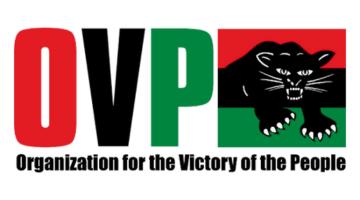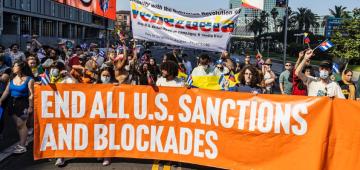Andiaye, a tireless advocate for the rights and welfare of women in Guyana, agitated against the system’s “way of organizing the economy which creates poverty and then criminalizes it.”
“The life of this woman cannot be transformed except if we confront the power relations that underlie both the domestic and the economic violence.”
Born Sandra Williams in Georgetown, Guyana in 1942, Andiaye was an educator, a writer, a care-work advocate, and a social, political, and gender rights activist who worked at the local and international levels to combat violence against Black women. She was an early member of the executive committee of the Working People’s Alliance and a founding member of the grassroots women’s organizationRed Thread in Guyana. In a multiracial society such as Guyana - with its African and Indian majorities -- Andiaye’s political work depended on radical anti-racist practice, and meant working from the bottom of race and class hierarhcies to challenge gendered and racial injustice. Her intellectual endeavors and activism addressed, specifically, African Guyanese women’s reproductive health, domestic violence, labor and the fight for a living wage, questions of economic development, and the need to organize “conspiracies of mutual caring.” As she fell ill with cancer, Andiaye was clear in her analysis of how society treats care work: “The unwaged work of caring for people the society dismisses as most unproductive, most unable to ‘work,’... is the most uncounted and unvalued work of all.” She ultimately succumbed to cancer on May 31, 2019, shortly after completing a collection of her writings, The Point is to Change the World, edited by her longtime comrade D. Alissa Trotz.
The 2013 essay “Knife Edge: Living with Domestic and Economic Violence,” captures something of the power and politics of Andaiye’s writing, as it focuses on the details of the layered violences within Caribbean societies that are often turned inward and fractured by class, gender, and race. She uses the example of Sonia Hinds, a woman brutally attacked by her male partner, to examine “the totality of violence against African Guyanese women” and the lack of legal protections afforded them. While the account of Hines in “Knife’s Edge” is specific and local, Andiaye also tells us that this story is important because it says that “we have to build a movement not only against the injustices of sex or the injustices of race, but against the economic system that we increasingly treat as a given, immovable…”
Knife Edge: Living with Domestic and Economic Violence
Andaiye:
Asked to speak about violence against African-Guyanese women, I was perhaps expected to deal with domestic violence alone, but I thought I could best bring alive the totality of the violence against African-Guyanese women in the short time I have by describing the violence in the life of one African-Guyanese woman—first, after years of emotional violence from her partner, the single, barbaric act of physical violence which altered her life permanently; and second, the everyday economic violence inflicted on her as it is on other women like her. My objective in putting these together is to make what is for me a self-evident point—that the life of this woman cannot be transformed except if we confront the power relations that underlie both the domestic and the economic violence.
On August 5, 2000, Sonia Hinds was crippled by her male partner. A later video interview with Red Thread shows her leaning over a large wooden tub washing clothes. She is rubbing them with soap, using the stumps of her arms, both of which had been chopped off below the elbow. She recounts how on the day of the assault the man had come up behind her and dealt her a blow with what she thought was a leather belt. As he continued she put up her arms to bar the blows. It was only when he stopped and she tried to use her arms to get up from the floor where she had fallen that she realized that she had been chopped, not hit, and that her lower arms were hanging, attached only by pieces of skin. He had also chopped her across her face. That one day she lost her hands and the sight in an eye. The man who disabled her for life received a 15-year sentence. In the video she recounted that she had entered a relationship with him because she wanted a decent and stable life, the father of her children having been a married man. Sonia Hinds was in her early forties at the time of the assault.
“She had been chopped, not hit, and that her lower arms were hanging, attached only by pieces of skin.”
Before then she had worked as a security guard and a seamstress, supporting herself and her children. Afterwards, she received severance pay since she was unable to continue the security guard work. Now she depends on an NIS disability benefit and public assistance, which together give her far less than she needs for basic expenses.
Sonia Hinds lives with the results of her partner’s violence: permanent impoverishment (no employer would want her); loneliness (no man would want her); isolation (she goes out very little); dependence (while she does some of her housework herself—her daughters are now grown and live away— she can’t cook or clean so she needs the help she gets from a niece). Her life having been upended by her partner’s brutality, she lives every day with the memory of it, and with the silence that is the response of too much of our society to the war against women which results in one of every three or four women in Guyana being victims of domestic violence. It is a war not only against African-Guyanese women but against Indian-Guyanese and Indigenous women and women of other groups. It is waged not only against women of the working class but against women of all classes; but women of the working class have the least resources to escape it.
There is another kind of violence that affects African-Guyanese working class women. Like Sonia Hinds before she was chopped, many thousands of working class African-Guyanese women work in very low-waged areas of work with little or no legal protection. Usually, like her, they operate in at least two areas of work at the same time, often more. Most work in the massive informal sector which exploded into being in the 1980s.
“Many thousands of working class African-Guyanese women work in very low-waged areas of work with little or no legal protection.”
This violence is assaulting African-Guyanese women, in particular. It is not that there is no economic violence against grassroots women of other races or against grassroots men. There is plenty. Among African-Guyanese the situation of working class men is also dire. But the economic violence against poor people has a particular impact on African-Guyanese women and therefore on African-Guyanese children.
On October 7, 2012, I had a letter in the press responding to an article celebrating a 39-year-old African-Guyanese single mother of five boys who also worked as a security guard, sweeper/cleaner, drainage worker, including on Sundays, maker and seller of pointer brooms, grower and seller of plants, and maker and bottler of products like pepper sauce with other women. That’s one woman. She had no electricity, which made most household tasks take longer. Her workday added up to at least 20 hours (not counting many of her household tasks, including checking that the children had done the tasks they were assigned to do; that they’d attended the lessons she sent them to in part so they would be “meaningfully occupied” while she earned money—$10,000 of which went to pay for the lessons; and all the other tasks of raising five boys aged 9–13 to not become statistics of “failure.” She also took Home Economics, Maths and English classes in the hope that they would lead to better-paid jobs.
For every mother who manages to ensure that her children don’t become statistics of failure, at whatever cost to herself and them, there’s a larger number of mothers who don’t succeed. They are all around us. In the main, they fail not because they are “wutless.” To say only that they are examples of the continuing legacy of slavery doesn’t make sense, because if that is the whole story then why is the situation today worse, as we can all see that it is? No. They are also continuing victims of a way of organizing the economy which creates poverty and then criminalizes it; which imposes on poor families a choice between being superhuman or being beaten down by inhuman conditions; which destroys families without a care—today, via a massive migratoriness of labor in a world where capital can travel freely but not labor, and where labor therefore migrates under conditions that tears families apart, and is tearing apart the kind of extended family and community which was the bedrock of African-Guyanese survival. [Note: One of the Global Women’s Strike demands is “Capital travels freely—why not labor?”] Look, for example, at what’s happening with the CARICOM Free Movement of People where CARICOM says you can travel, but individual governments fail to introduce the mechanisms which would allow you to place your children in school in the country you’re migrating to work in. So you have to leave them. For me, these are root causes.
“Labor migrates under conditions that tears families apart.”
In most discussions on African-Guyanese and the economy, the focus tends to be on the deliberate acts of economic sabotage against our ancestors as they worked to build the villages they bought after slavery; plus today, on the impact of corruption, nepotism, cronyism and discrimination on the African-Guyanese economy. But if we found a way to end today’s corruption, nepotism, cronyism and discrimination, as we must, and maintained the dominant economic model and policies, the problems would not be solved. There would still be fundamental problems deriving from how capitalism and most clearly, unregulated, unbridled, unrestrained, predatory capitalism works; how it is set up to work even if racism is not the prime motivator; the role played by International Monetary Fund (IMF) policies which here we call Structural Adjustment and in Europe they call “austerity.” We know those policies are not class-neutral, but seem to ignore the fact that they’re also neither race-neutral (in Guyana cuts in the public sector, including in the 1980s, put many African-Guyanese women and men out of work), nor gender-neutral (when you cut public spending you increase the unwaged caring work that is done mainly by women).
Ending the corruption, nepotism, cronyism and discrimination would not by itself solve the problem of what is happening at the level of the household economies of poor people—which requires us to look for the solution where it belongs, and that cannot be just at the level of the individual household. A Stabroek News editorial of Thursday, October 18, last, which salutes two mothers, the one we just heard about and the other, a newspaper vendor, who, it said, “scrimped, scraped and saved to send her third child to university and law school,” seemed to be proposing that we can end poverty by individual sacrifice, which—according to the editorial—can start “a revolution against poverty.” On August 2, 2013, less than a year later, the media had another report on the same woman: she is the mother in Sophia whose husband chopped her and their children on Emancipation Night, including the one who is now a lawyer.
Even if you do not encounter these women in your daily life you see them on the TV when someone has interfered further with their ability to earn—not a living but a partial living: “I’se a single mother with five children and now they want to move my stall and wuh they expect me fuh do?” They are security guards, street vendors, domestic workers, low-cost seamstresses or street-side givers of pedicures and manicures, mini bus conductors, shop assistants, cooks, cleaners or waitresses in cook shops, sex workers. They work unbelievable hours. They often have no one at home, not even an older child, to care for the other children. The other relatives who would once have taken up the slack, including sometimes the other parent, are either somewhere else in the country or out of the country trying to earn money. Worse, we have families without a single resident parent or guardian. Men are part of the huge migrations we are seeing today but more women than men are migrating in the Caribbean. We have mothers who are “catching dey hand” in another country while their children “catching dey tail” living on their own or moving from house to house, because both immediate families and extended families have scattered. In the letter I went on:
“They often have no one at home, not even an older child, to care for the other children.”
Only a fool would say there are no bad mothers among us; clearly there are. But there are far more who are “mothers extraordinaire” (the term Stabroek News used). Some succeed in raising their children on the “straight and narrow” and deserve honor. But when we ignore or demonize the others who also deserve our respect even though their hard work does not lift their families out of poverty, then the mothers themselves, their children, and the whole society—all of us pay.
What a member of the audience has called a “vision of liberation” has to be seen from the point of view of Sonia Hinds, the woman whose story says to me that we have to build a movement not only against the injustices of sex or the injustices of race, but against the economic system that we increasingly treat as a given, immovable, and which exploits and oppresses Sonia Hinds via the unequal power relations of sex, race, class, age, dis/ability and nation. Nothing less can liberate her.
Andaiye, “Knife Edge: Living with Domestic and Economic Violence,” in The Point is to Change the World: Selected Writings of Andaiye edited by Alissa D. Trotz (London:
An earlier version of this essay was presented at a forum on “The State of Black African Guyana: a time for renewal and empowerment,” organized by the Ghana Day Committee in collaboration with the Cuffy 250 Committee held on Sunday, August 4, 2013. Since that original was lost, it’s been recreated here partly from memory and partly from a newspaper report on the talk in Stabroek News, August 5, 2013.
COMMENTS?
Please join the conversation on Black Agenda Report's Facebook page at http://facebook.com/blackagendareport
Or, you can comment by emailing us at comments@blackagendareport.com



















